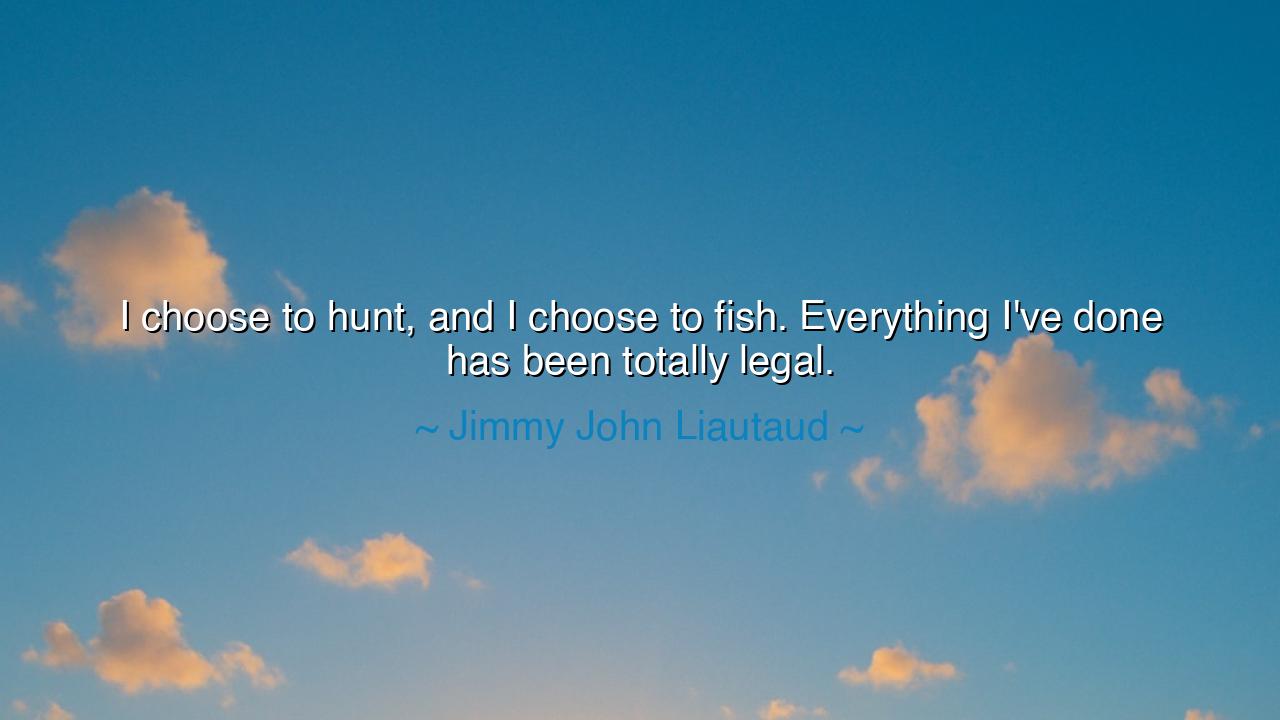
I choose to hunt, and I choose to fish. Everything I've done has






When Jimmy John Liautaud said, “I choose to hunt, and I choose to fish. Everything I’ve done has been totally legal,” his words resound with the quiet defiance of a man who stands firm in the face of judgment. At first, his declaration seems simple — a defense of personal choice — but beneath it lies a deeper principle: the eternal right of the individual to live according to his own conscience, so long as that life honors the bounds of law and respect for nature. In this statement, Liautaud does not boast of his actions; he asserts the sovereignty of choice — that sacred space where a person’s values, passions, and duties converge. His tone is not one of arrogance but of clarity — an insistence that lawful freedom should never be condemned by moral confusion.
The origin of this quote lies in the controversy that once surrounded Liautaud, the founder of the sandwich empire Jimmy John’s, who came under public criticism for his participation in hunting expeditions abroad. Photos of his hunts — particularly those involving big game — ignited outrage across social and digital arenas. Yet his response was not one of retreat, but of principle. “Everything I’ve done has been totally legal,” he said, invoking the defense of legitimacy and intention. He reminded the world that hunting, when done within the parameters of law and conservation, is not an act of destruction, but one of balance — a practice deeply rooted in human heritage. His words reveal the tension between modern sensibility and ancient instinct, between societal opinion and personal virtue.
To hunt and to fish are acts as old as humankind. In the ancient world, they were not sports or spectacles but sacraments — rituals of survival and reverence. The hunter stood not as conqueror, but as participant in the great circle of life. The Greeks honored Artemis, goddess of the hunt, as the protector of both hunter and prey, for she embodied the balance between necessity and respect. Likewise, among the Native peoples of the Americas, hunting was guided by spiritual law: one must never take more than needed, and one must give thanks to the spirit of the animal. Liautaud’s statement, in its modern form, echoes that ancestral wisdom — that lawful hunting is not an act of arrogance, but a continuation of humanity’s ancient dialogue with the natural world.
Yet in an age where images travel faster than understanding, perception often outweighs truth. Many who saw Liautaud’s photographs saw only violence, not context. But the deeper message in his defense lies not merely in his justification, but in his call for perspective — that morality cannot be measured by outrage alone. He reminds us that legality is not the enemy of ethics, and that the laws protecting wildlife are often written not by destroyers, but by stewards. In this way, his words rise beyond his own defense and become a meditation on how freedom must be practiced within order, how choice, if guided by responsibility, remains the cornerstone of human dignity.
There is an ancient parallel in the story of Theodore Roosevelt, the great American president and conservationist. Roosevelt was himself an avid hunter, yet he was also the father of the modern national park system and one of the fiercest defenders of wildlife preservation. He once wrote that the hunter who hunts rightly becomes “the best friend of the animal he hunts.” His passion for the chase was tempered by reverence for the wild. So too, Liautaud’s words, when read through the lens of reason, express this balance — that to live in harmony with nature is to engage with it truthfully, neither exploiting it nor denying its primal call.
But the heart of Liautaud’s statement also touches upon something more profound: the moral courage to stand by one’s convictions in a world that thrives on condemnation. His phrase “I choose” is powerful — for choice is the essence of human freedom. To choose is to act deliberately, not reactively; it is to live consciously, not passively. Whether one agrees with his actions or not, the deeper message endures — that a person must live with integrity, ensuring that their deeds are not only lawful, but born from self-awareness and accountability. This is the essence of ethical freedom: doing what one believes is right, while honoring the boundaries of law and respect.
Let this be the lesson drawn from his words: that judgment without understanding is hollow, and freedom without conscience is perilous. Each person must learn to balance passion with principle — to act boldly, yet justly; freely, yet within the bounds of honor. Whether one hunts in the wild, builds a business, or stands for belief amid criticism, the rule is the same: live openly, act lawfully, and stand by your truth. In this way, one earns not only the right to speak, but the peace of having lived without deceit.
And so, Liautaud’s statement, simple though it seems, becomes a parable for all generations: that the true measure of a person is not in how loudly the world praises or condemns them, but in how steadfastly they walk the path they know to be right. To choose — and to choose rightly, with knowledge, humility, and lawfulness — is the mark of a free and honorable soul.






AAdministratorAdministrator
Welcome, honored guests. Please leave a comment, we will respond soon